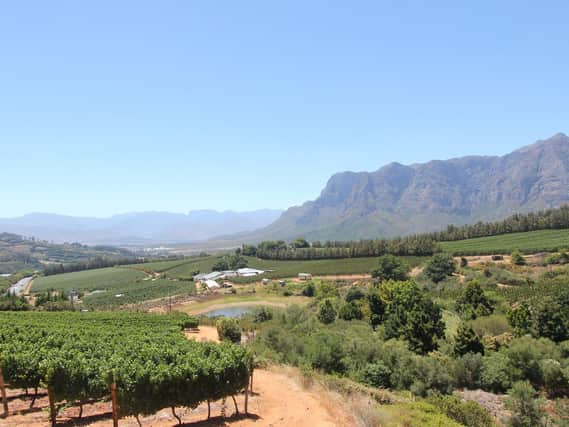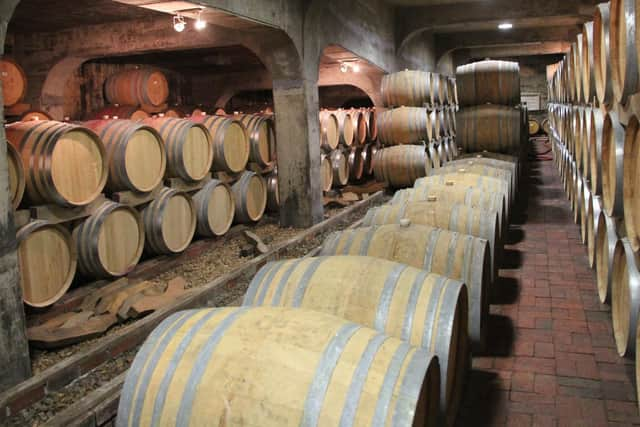Limited edition bottles can be a great way of exploring new wines and innovative producers


There’s that open pack of bacon, a few posh mushrooms, the remains of an expensive bar of chocolate that you used for grating and maybe half a pack of fresh raspberries that were scattered over the dessert. In other words, your fridge is full of gorgeous leftovers.
Now think how a winery is after a blending session. All wineries have their regular range of wines, and they know pretty much what is going in them. But in years when they slightly change the blend, or they are working on a new project, or they help out a farmer because he has some rather good grapes, there are always leftovers.
Advertisement
Hide AdAdvertisement
Hide AdAnother reason for leftovers is that a retailer may overestimate the amount they will sell and put an option on several barrels of wine, but then they change their minds and the wine ends up without a home.


Most wineries cannot cope with those tanks of leftover wine, apart from blending it away into a bigger batch where it loses its character and is sold off as bulk wine.
This is where “Rick” comes in. Rick is the alter ego of Richard Kelley, Master of Wine, a Northern-based UK wine importer who lived for several years in South Africa.
He knows the wineries, their vineyards and the people. He knows when they have made deals with particular growers to get a parcel of their special grapes, and which winemakers are testing blends for future wines. So he knows where those tanks of rather special wines are. That’s when he tastes them and if he can find a purpose for them, he buys them.
Advertisement
Hide AdAdvertisement
Hide AdRick is the Liberator. He liberates those parcels of wine from the tanks, makes a label for them and sends the bottles to the UK. The thing is, because they are leftovers, they are in very limited quantities, but all of them are special wines, many from some of South Africa’s top wineries.
The latest releases have arrived in Yorkshire and are already flying off the shelves. Hoults in Huddersfield took four pallets of assorted Liberator wines and has already sold out of several of them.
The current releases include a sparkling wine that has spent five years on its lees. There’s a Merlot from Nederburg, one of South Africa’s most respected wineries. There’s a Grenache Blanc from DeMorgenzon, a gorgeous winery making really expensive wines, although this one is very reasonable. The list goes on.
There are two main difficulties in buying these wines. The first is – you have to be quick. They come in limited quantities, and once they are gone, they are gone.
Advertisement
Hide AdAdvertisement
Hide AdThe second difficulty is that they have names such as Four and Twenty Blackbirds, A Good Year for the Roses, the World Turn’d Upside Down, which are distinctive but difficult to remember.
This is why they also come with Episode numbers. These relate to the wine and its blend. To find out exactly what is in the wine you will need to read the back label, or the website www.theliberatorwine.com where you can also appreciate some of the madcap poetry that Rick the Liberator has decided goes well with the wine.
So essentially these wines do a great job in tidying up the cellars, wine barrels and tanks of South African producers. They also provide wines from top producers at prices that would be several times more if they carried their real provenance. And they add some fun to drinking wine.
There’s an element of taking a chance and seeing if you like it. After all, these days we can’t go and visit a winery, so why not have an adventure with the wine in your glass?
Advertisement
Hide AdAdvertisement
Hide AdHere are some of my favourite Liberator wines, and stockists at the time of writing.
Episode 29, Chenin No5 Rick in a Tin, around £4.25 – Yorkshire Vintners; Harrogate Wine: This slim can contains one-third of a bottle of stunningly good Chenin from a producer so famous I am not allowed to tell you who it is. A gorgeous wine, with ripe, peachy fruit, backed by lemon rind with a fabulous mouth filling, almost waxy texture. Also available by the bottle at around £11 from the Wright Wine Co and Harrogate Wine.
Episode 27 the World Turn’d Upside Down 2018, around £14.99 – Harrogate Wine, the Wright Wine Co, Skipton: From the chic and successful DeMorgenzon estate, this is Grenache Blanc with tangy pear and pineapple fruit, hints of orange zest and a rounded, elegant texture.
Episode 24 Four and Twenty Blackbirds 2009, around £19 – Harrogate Wine, the Wright Wine Co, Hoults of Huddersfield: Mature elegant Merlot from the famous Nederburg estate. It has deep, black fruit-driven flavours, with oak definitely in the background and a lingering finish that makes it perfect for Sunday lunch.
Advertisement
Hide AdAdvertisement
Hide AdEpisode 21 MSG 2017 – the Wright Wine Co, £19: A classic Rhône blend, sourced from Lammershoek with 80 per cent Mourvèdre giving powerful blueberry and blackberry fruit, with savoury earthy notes and a light, peppery finish.
Episode 30, Come Quickly I am Drinking the Stars, around £24 – Harrogate Wine, Hoults: A delicious sparkling wine, made from barrel-fermented Chardonnay and Pinot Noir, aged for 66 months on the lees. The result is a creamy, elegant fizz with nutty overtones and a crisp, clear style.
The Bishop of Norwich Late Bottle Vintage 2012 – Harrogate Wines, the Wright Wine Co, Roberts & Speight, Beverley, £19.89-£22, and by the glass at the Black Swan, Oldstead: Don’t call it port – that has to come from Portugal, but the Bishop is made from a field blend of the same grapes planted at historic Stellenbosch estate Muratie, aged in cask for eight years.
It is gorgeously deep in flavour, with baked plums, spice and a surprisingly fresh finish. Goes fabulously well with chocolate puddings and cheese.
Advertisement
Hide AdAdvertisement
Hide AdAnd the reason for the name? Port decanters are always passed from right to left, but if a guest forgets to pass the decanter on, he is usually asked “Do you know the Bishop of Norwich?” which is code for “pass the port”. This works only if that person is not a member of the clergy who may actually know the Bishop of Norwich.
Support The Yorkshire Post and become a subscriber today. Your subscription will help us to continue to bring quality news to the people of Yorkshire. In return, you'll see fewer ads on site, get free access to our app and receive exclusive members-only offers. Click here to subscribe